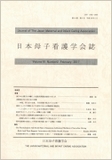Japanese
English
- 有料閲覧
- Abstract 文献概要
- 参考文献 Reference
- サイト内被引用 Cited by
目的
本研究は、高年初産婦の産後1か月間の疲労感と抑うつ状態との関連を明らかにすることである。
方法
2014年10月から2015年9月にA施設で出産した母児同室中の高年初産婦105名に対し、「産後の疲労感」尺度とEPDSを用いて自記式質問紙調査を実施した。この内、継続調査に同意が得られた10名には、退院後1週間、産後1か月に同内容の調査を実施し、経時的変化を分析した。本研究は、研究者が所属する倫理審査委員会の承認を得て実施した。
結果
母児同室中の対象者全体の「産後の疲労感」尺度合計点は91.1±17.5、抑うつ群34名(32.4%)であった。抑うつ群の尺度合計点は非抑うつ群より高く、有意差が認められた(p<0.01)。尺度合計点とEPDS得点との間には、正の有意な相関が認められた(r=0.651,p<0.01)。下位尺度とEPDS得点においては、精神的ストレス状態で正の有意な強い相関が認められた(r=0.716,p<0.01)。
継続事例(10名)の尺度合計点は、母児同室中101.7±17.3、退院後1週間90.0±14.5、産後1か月82.7±16.4と漸減し、反復分析で、母児同室中と産後1か月の間に有意差が認められた(p<0.01)。抑うつ群の推移は、退院後1週間で母児同室中の半減となり、その後も同様に減少した。EPDSが産後1か月まで持続して9点以上だった母親は1名で、この母親は、尺度合計点が高値で推移しており、下位尺度の「精神的ストレス状態」得点が高い状態で持続した。
結論
産後の疲労感と抑うつ状態との間に関連が認められ、「産後の疲労感」尺度合計点の推移から、抑うつ状態のフォローアップの必要性を判断する指標になることが推察された。産後の疲労感と抑うつ状態は、出産後の母児同室中が最も高く、産後1か月にかけて時間の経過と共に減少していった。出産後の抑うつ状態は、退院後1週間頃には、抑うつ状態が軽減する傾向がみられたため、産後うつ病の発症時期である産後2週間目(退院後1週間)頃に抑うつ状態を再評価することが重要である。
Objective
To clarify the relationship between a feeling of fatigue and a depressive state in late-birth primiparas during one month after childbirth.
Methods
With the "Postpartum Fatigue Scale(PFS)" and the "Edinburgh Postnatal Depression Scale(EPDS), a self-completed questionnaire survey was conducted on 105 late-birth primiparas under rooming-in who delivered from 10/2014 to 9/2015 at a facility A. A follow-up survey was conducted on 10 puerperants who consented to it to observe time-dependent changes one week after discharge and one month after childbirth. This study was conducted after approval by the Ethical Committee of Toho University.
Results
The total PFS score of all participants during the rooming-in period was 91.1±17.5 points. Those who were categorized into Depression group were 34 mothers(32.4%) and the total PFS score of Depression group was significantly higher than that of Non-depression group(p<0.01). A positive correlation was observed between the total PFS score and the EPDS score(r=0.651, p<0.01). As for PFS-subscales vs. the EPDS score, a strong positive correlation was observed in the psychological depressive state(r=0.716, p<0.01).
The total PFS score of the 10 mothers who were continuously monitored was 101.7±17.3 points during rooming-in, 90.0±14.5 one week after discharge and 82.7±16.4 one month after childbirth, thus showing a gradual decrease, and repeat analyses demonstrated that the decrease was statistically significant between the rooming-in period and one month after childbirth(p<0.01). The PFS score of Depression group fell to a half one week after discharge and continued to decrease similarly thereafter. In only one mother, the EPDS score remained 9 points or more even one month after childbirth, and her total PFS score also remained high. Specifically, her score for a "mental stress state" among the sub-scales was maintained at a high level.
Conclusions
An association was observed between a feeling of postpartum fatigue and a depressive state, and the total PFS score was suggested to become an indicator to assess the necessity of follow-up of a depressive state with the time-course change in the total score. The score for a feeling of postpartum fatigue and a depressive state were highest during the rooming-in period followed by gradual decreases over one month after childbirth. A postpartum depressive state tended to resolve around one week after discharge. Therefore, it is necessary to re-assess a depressive state around two weeks after childbirth(i.e. one week after discharge) when a depressive state is prone to occur.
Copyright © 2017, The Japan Maternal and Infant Caring Association All rights reserved.


